#chinonye chukwu
Photo
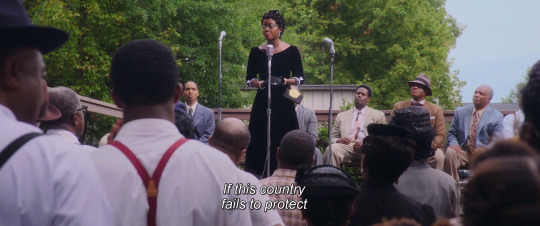


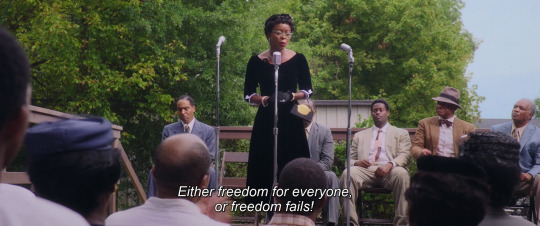
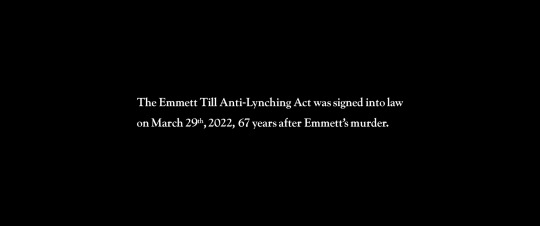
Danielle Deadwyler in “Till” (Chinonye Chukwu, 2022)
#danielle deadwyler#emmett till#till#chinonye chukwu#african american#female directed films#female filmmakers#female directors#female screenwriters#women in film#racism#POC#human rights
292 notes
·
View notes
Text

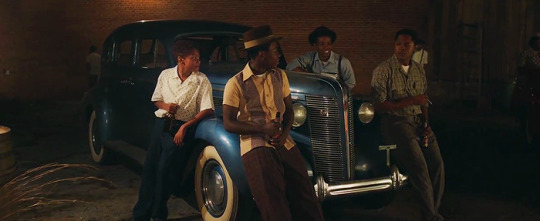


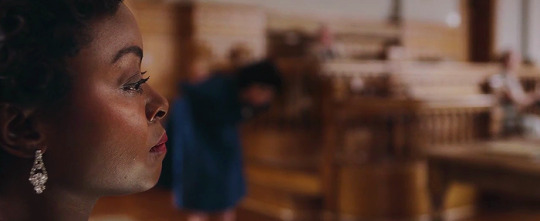
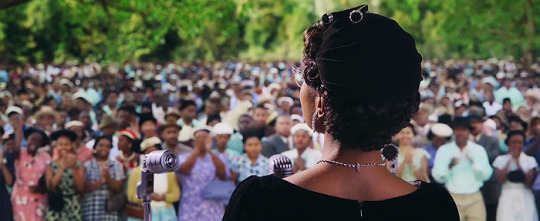
Till (2022, Chinonye Chukwu)
#till 2022#till movie#danielle deadwyler#chinonye chukwu#filmtag#post#just had to do smth quick bc how are there no posts on tumblr?!? what has film tumblr become?!?
112 notes
·
View notes
Video
youtube
TILL | Official Trailer | MGM Studios
Witness the power of a mother’s love. The powerful story of Mamie Till-Mobley’s quest for justice for her son, Emmett.
CAST: Danielle Deadwyler, Whoopi Goldberg, Jalyn Hall, Frankie Faison, Jayme Lawson, Tosin Cole, Kevin Carroll, Sean Patrick Thomas, John Douglas Thompson, Roger Guenveur Smith, and Haley Bennett.
DIRECTED BY: Chinonye Chukwu
WRITTEN BY: Michael Reilly, Keith Beauchamp, and Chinonye Chukwu
In theaters this October.
#Till#Till Movie#Mamie Till Mobley#Emmett Till#Danielle Deadwyler#Whoopi Goldberg#Jalyn Hall#Frankie Faison#Jayme Lawson#Tosin Cole#Kevin Carroll#Sean Patrick Thomas#John Douglas Thompson#Roger Guenveur Smith#Haley Bennett#Chinonye Chukwu#Keith Beauchamp#Michael Reilly#trailer#movie trailer#Black in Period Films
173 notes
·
View notes
Photo
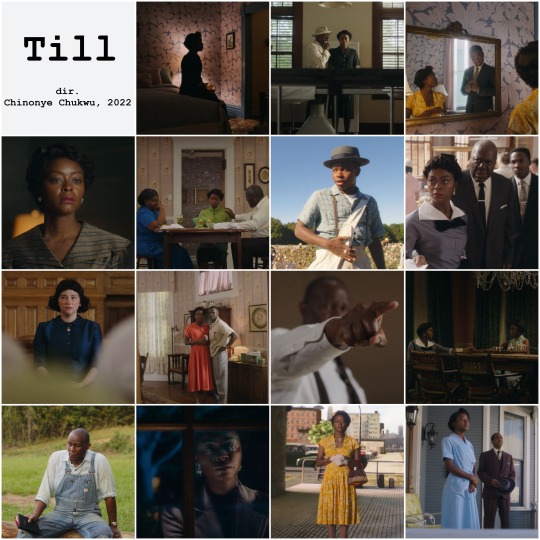
Till
directed by Chinonye Chukwu, 2022
#Till#Chinonye Chukwu#movie mosaics#Danielle Deadwyler#Sean Patrick Thomas#Jalyn Hall#Whoopi Goldberg#Frankie Faison#Tosin Cole#Haley Bennett#John Douglas Thompson#Jayme Lawson#Kevin Carroll
33 notes
·
View notes
Text
Till (2022, dir. Chinonye Chukwu) - review by Rookie-Critic
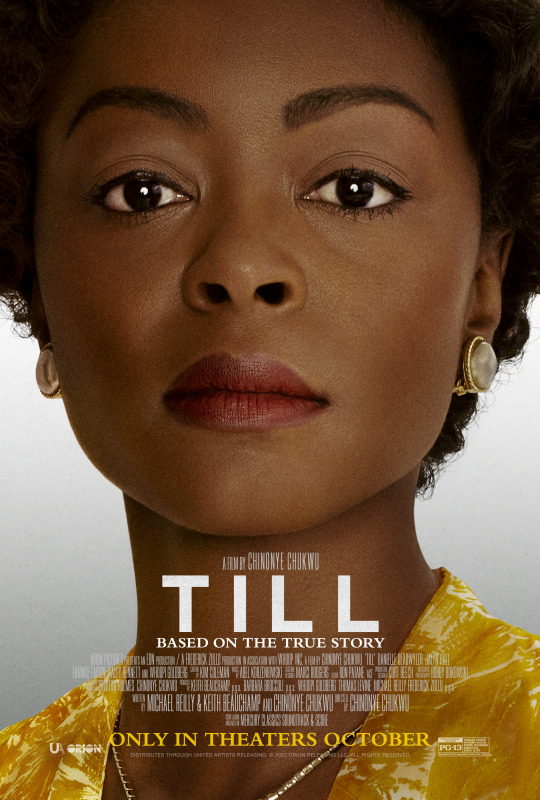
Till was the rare biopic that manages to rise above the genre trappings and give its audience something a little more than just a rehashing of historical events. By putting Mamie Till-Mobley at the film's center and focusing on the grief of a mother who needlessly lost her son to racist brutality, Chukwu has allowed the film to breathe, and has allowed the audience to come in and be outraged and distraught with her. The film never feels emotionally manipulative, which would have been very easy to do here. Instead, the film starkly shows the nature of what happened that day, and how Till-Mobley handled the aftermath, the history speaks for itself here, and Danielle Deadwyler is merely performing as a conduit for her grief, her anger, and her determination. Other civil rights figures of the time, such as Medgar Evers and T. R. M. Howard make appearances, and instead of pulling major focus towards these very famous figures, the film instead allows them to take a backseat. This is not their story, it's Till-Mobley's, and Chukwu respects the real life people this movie is based on enough to allow them to take center stage and never falters from that. There's really not a lot else to say, it's just an incredibly well-made historical drama with an oft overlooked, wildly sympathetic and empowering woman at its core. Till is well worth the watch.
Score: 9/10
Currently available to rent or purchase on digital (iTunes, Amazon, Vudu, etc.) and to pre-order on DVD & Blu-ray through Orion/Universal Studios/Metro-Goldwyn-Mayer.
#Till#Emmett Till#Mamie Till-Mobley#Chinonye Chukwu#Danielle Deadwyler#Jalyn Hall#Whoopi Goldberg#Haley Bennett#Sean Patrick Thomas#Frankie Faison#Jayme Lawson#Tosin Cole#Kevin Carroll#John Douglas Thompson#Roger Guenveur Smith#film review#movie review#2022 films
18 notes
·
View notes
Photo
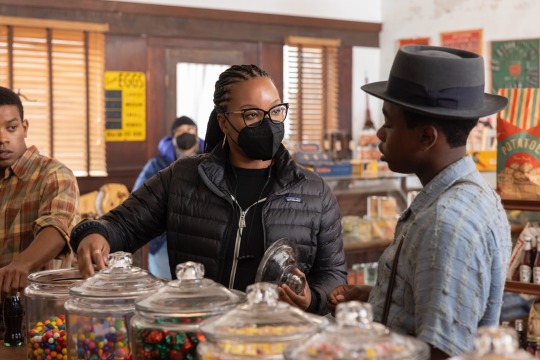

Chinonye Chukwu on the set of Till
18 notes
·
View notes
Text

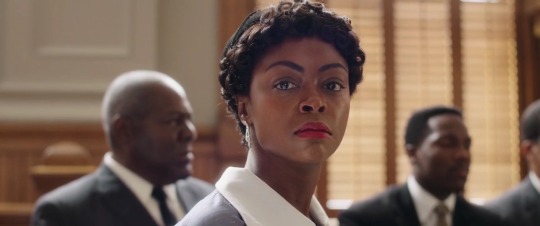



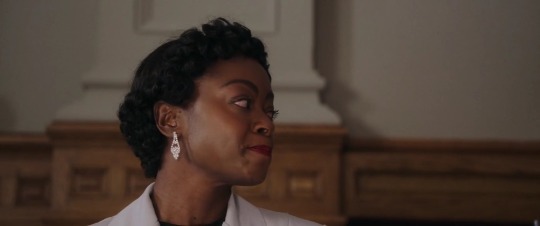

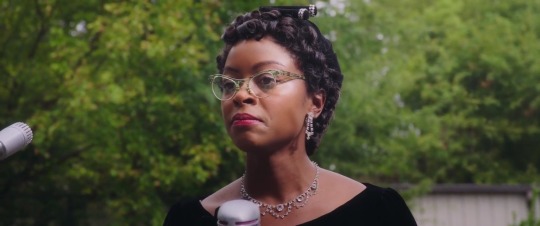


#till#chinonye chukwu#frankie faison#whoopi goldberg#danielle deadwyler#john douglas thompson#jayme lawson#jalyn hall#bonus shots#dope shit
16 notes
·
View notes
Text
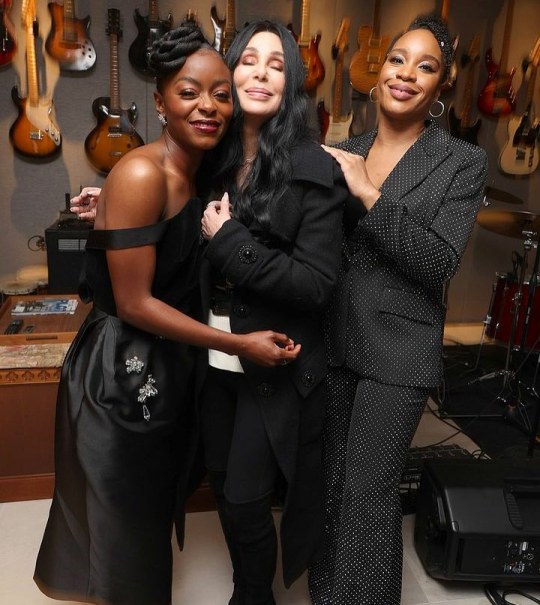



Cher hosted a screening of the movie Till. If anyone knows the names of the other lovely people in these photos please let me know ❤️
7 notes
·
View notes
Text

Films of 2022: Till (dir. Chinonye Chukwu)
Grade: C

4 notes
·
View notes
Text
Till (12): "And the Oscar goes to... Danielle Deadwyler".
Till (12): “And the Oscar goes to… Danielle Deadwyler”.
A One Mann’s Movies review of “Till” (2023).
OH. MY. WORD. “Till” was an emotional ride I was really not expecting, but seldom has the success of a film rested so firmly on the back of its leading lady.
Bob the Movie Man Rating(s):
Plot Summary:
Marnie Till-Bradley (Danielle Deadwyler) is living a good life in Chicago. She has a job, a nice house, parents living nearby and a fine boy by the…
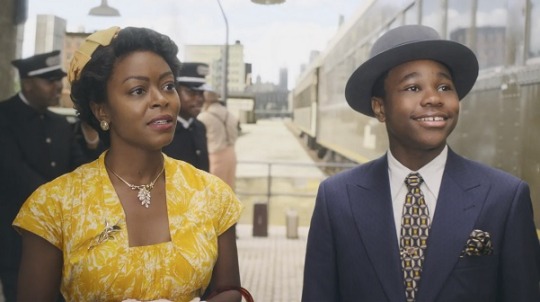
View On WordPress
#TillMovie#bob-the-movie-man#Chinonye Chukwu#Cinema#Danielle Deadwyler#Film#film review#Jalyn Hall#John Douglas Thompson#Keith Beauchamp#Michael Reilly#Movie#Movie Review#One Man&039;s Movies#One Mann&039;s Movies#onemannsmovies#onemansmovies#Oscar#Till#Whooping Goldberg
2 notes
·
View notes
Text
The Top 10 Films of 2022
Honorable Mentions are as follows Guillermo Del Toro’s Pinocchio, All the Beauty and the Bloodshed, Turning Every Page, Smile, Lightyear, Bones and All, Tar, The Menu, Woman Talking, Al Quiet on the Western Front, Emancipation
10: Decision to Leave
7.3/10 IMDB 94% Rotten Tomatoes. 3.9/5 Letterboxd
A detective investigating a mans death in the mountains and ends up meeting and developing…

View On WordPress
#A Man Called Otto#Alexander Skarsgard#All Quiet on the Western Front#All the Beauty#and the Bloodshed#Anya Taylor Joy#Austin Butler#Barry Keoghan#Baz Luhrman#Brendon Fraser#Brendon Gleason#Chinonye Chukwu#Colin Farrell#Daniel Kwan#Daniel Schienart#Danielle Deadwyler#Darren Aronofsky#Decision to Leave#Elvis#Emancipation#Ethan Hawke#Everything Everywhere All at Once#Gabriel LaBelle#Glass Onion A Knives Out Mystery#Greg Fraser#Guillermo Del Toro&039;s Pinocchio#Hae il Park#Hong Chau#Jalyn Hall#Jamie Lee Curtis
3 notes
·
View notes
Text
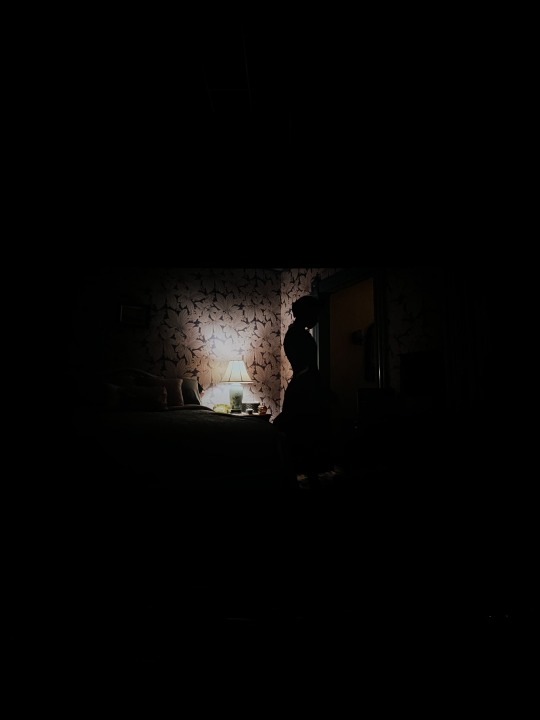
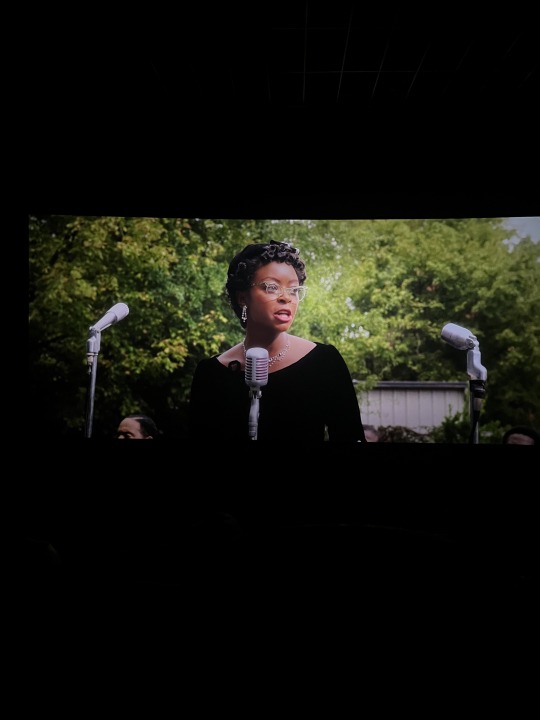
TILL (2022)
Absolutely struck by this film, I'm just home from seeing this by myself and honestly spent about 70% of the movie in floods of tears.
I'm ashamed to admit I did not know much of Emmett Till and his story, but knowing the premise for the film I felt very tense for the first 30 or so minutes knowing something bad was going to happen to the sweet boy, the music really played into that - the score was exceptional.
I saw a little bit of backlash or hesitation online before going to see this film that it would show yet more aggression and violence towards black people, and exploit black trauma on the big screen but the director Chinonye Chukwu was very insistent this would be avoided at all costs. The story was very much centered around his mother Mamie, her grief, her story, and how her influence impacted civil rights in America and so although I have no authority to speak on it, to me it still felt like a story worth making.
The visceral, bone-chilling screams and tears of both Mamie (Danielle Deadwyler) and her Aunt (?) in the film will stay with me for a long time, and really seek to show that there is nothing more powerful than a parent's love for their child and the lengths they would go for them. Mamie has some epic dialogues, including an epic Oscar nom carrot that contained the lines "The murder of my son has shown me that what happens to any of us, anywhere in the world, had better be the business of all of us."
The costume work was also beautifully done, the light, colour, and intricacy of the clothes Mamie wears/are shown in Chicago contrast heavily with the simplicity of the Mississippi scenes further emphasizing the point made in the film that life had become more sophisticated/refines [? both of these are the wrong word I'm sorry] for people of colour away from the still segregated South. There is still present discrimination in Chicago, we see Mamie as the only person of colour at work and then "advised" that she may be more comfortable shopping in the basement of Marshall Field's [where I actually went for a drag brunch this summer!] with other women that look like her, but when she firmly states that she's fine where she is there are no dangerous repercussions for her unlike those to come for her poor son. The outfit Mamie wears for the trial absolutely slays and makes me want to look for A-Line skirts. They also pay close attention to Mamie getting ready, frequent close-ups of earings coming on and off, jewelry and accessories like bags / shoes made constantly throughout the film and I think there's some smart comment to be made about linking the importance of presentation in black culture with both religion and the seriousness of the rights work being done, especially in an era where discrimination was still so present but I'm not informed / awake enough to make it.
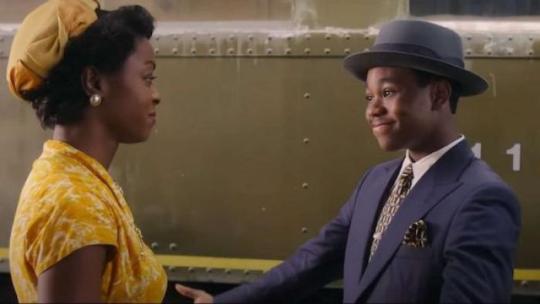
One thing the film also highlights at the credit role is the last impact of Emmett Till's death, his mother Mamie became a leading Civil Rights activist and taught in public schools for many years to come. I also found out that ONLY IN 2022 has lynching officially been made a federal crime, signed into law by Joe Biden earlier this year, almost 80 years after the incidents of this film. The Emmett Till Antilynching Act officially recognises lynching as a crime, although evidence could have been brought forwards previously for an assault or homicide case, there are certain nuances with lynching - I think it's something ot do with the conspiracy surrounding it and the creation of fear and intimidation that make it easier for a wider group of people to be found guilty not just a main assailant, so making this a federal crime prevents certain states ability to reduce aspects of the sentencing. I don't know enough to write any more on it, but from what I understand this is more of a symbolic federal law addition but still, one that's come way too late.
Overall a solid 8/10 for this one, beautiful piece of work, with amazing performances & costumes, but I think the pacing was a little bit slow at times and there was just one too many flashbacks for me.
4 notes
·
View notes
Text

Till (2022, Chinonye Chukwu)
11 notes
·
View notes
Photo
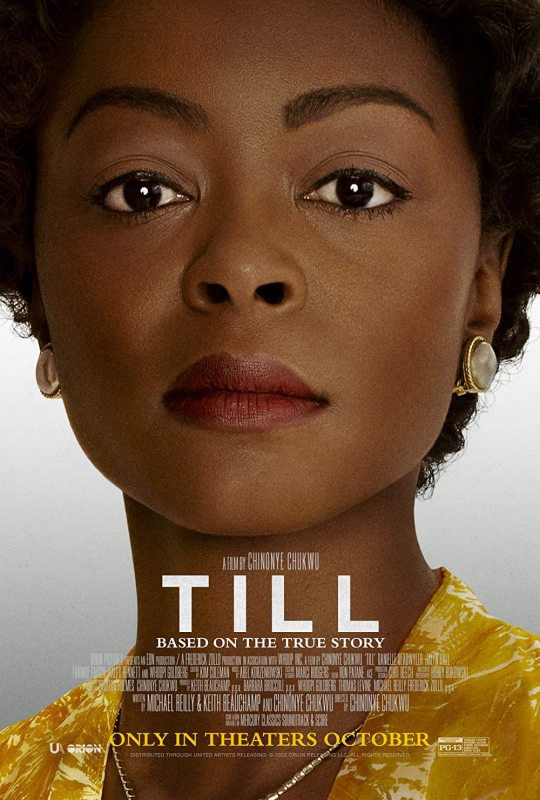
Till (2022)
This is a Movie Health Community evaluation. It is intended to inform people of potential health hazards in movies and does not reflect the quality of the film itself. The information presented here has not been reviewed by any medical professionals.
Till has a few scenes with bright but infrequent camera flashes. They are sudden, but never fast enough to create a strobe effect.
There are a few disorienting spinning shots, as well as some mild handheld camera work. Several scenes take place in moving vehicles.
Flashing Lights: 2/10. Motion Sickness: 4/10.
TRIGGER WARNING: This film tells the story of a real-life, racially-motivated murder of a child. The body is shown extensively on-screen in lingering shots, horribly mutilated and affected by the elements. The sounds of the murder are heard from a distance for close to a full minute. Racial slurs are used.
Image ID: A theatrical poster for Till (2022)
#Movie Health Community#Health Warning#Actually Epileptic#Photosensitive Epilepsy#Seizures#Migraines#Motion Sickness#United Artists#Till#October#2022#Danielle Deadwyler#Jalyn Hall#Frankie Faison#Haley Bennett#Whoopi Goldberg#Chinonye Chukwu#Rated PG-13
6 notes
·
View notes
Text
‘Till’ Review: He Was Someone’s Son, Too
Chinonye Chukwu’s new film reminds us that before his gruesome murder galvanized a civil rights movement, Emmett Till was a 14-year-old boy with a doting mother.
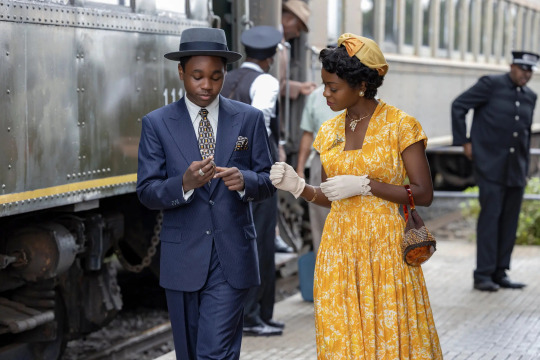
Jalyn Hall as Emmett Till and Danielle Deadwyler as his mother, Mamie, in “Till.”Credit...Lynsey Weatherspoon/Orion Pictures
By Manohla Dargis
Published Oct. 13, 2022
Updated Oct. 16, 2022
Some stories can seem too difficult to tell, though that doesn’t seem to have crossed the mind of the director Chinonye Chukwu. In “Till,” her haunted and haunting movie about Emmett Till, the 14-year-old whose barbaric murder in Mississippi in 1955 by white supremacists helped galvanize the civil rights movement, Chukwu revisits the past while doing something extremely difficult. She makes this grim American history insistently of the moment — and she does so by stripping the story down to its raw, harrowing emotional core.
In brisk strokes both sweeping and detailed, Chukwu — who shares the script credit with Michael Reilly and Keith Beauchamp — revisits Till’s life, winding back the clock to Chicago in 1955. There, the cherubic-faced Emmett (a tender Jalyn Hall) lives with his widowed mother, Mamie (a superb Danielle Deadwyler), in a cozy house and is eagerly preparing to visit relatives in Mississippi, a trip that hangs over his mother like a worrying cloud. Yet Mamie dotes on Emmett (she calls him Bo) and, as a gift, buys him a wallet at a department store, where she tartly rebuffs a white salesclerk who tries to steer her toward the basement.
By the time that Emmett is riding a train to the South — midway through the trip, the Black passengers stand and move en masse to the rear — a divided world of post-World War II optimism and jarring racial segregation has opened up. These divisions widen once Emmett arrives in Mississippi, where he stays with the family of Mamie’s uncle, a sharecropper, Moses (John Douglas Thompson). Soon, Emmett is helping Moses and his children pick cotton under the relentless sun — the palette suggestively lightened — and the camera sweeps over Black bodies toiling in the field as Antebellum America comes to unsettling life.
The horrors of that world soon emerge with devastating consequences. Emmett, along with some relations, visits a small grocery store that caters to Black customers but is run by white people. Things rapidly spiral downward when Emmett walks into the store and meets the contemptuous gaze of the woman behind the counter. The Northern salesclerk who insulted Mamie earlier was just a better-mannered racist; he was also an ugly foreshadowing. Now, away from Mamie and the life he knows, Emmett amiably tries to engage the woman, Carolyn Bryant (Haley Bennett), whose hostility ends in catastrophic violence. That evening, several white men kidnap, torture and murder Emmett, throwing his mangled body in a river.
Chukwu doesn’t show Till’s torture and death, a decision that is a clear, emphatically ethical artistic choice. “Till” is the third feature-length movie that she has directed, the latest following her 2019 drama “Clemency,” about a Black prison warden in crisis, and her work here is impressive. She handles the larger-scale period backdrop of “Till” and sprawling cast with confidence, using her expanded tool kit prudently and without sacrificing the intimacy that helped distinguished “Clemency.” And, just as she did in that drama, which was at once anchored and elevated by Alfre Woodard’s powerful lead turn, Chukwu distills a story — its gravitational force and emotional depths — into the movie’s central performance.
With fixed intensity and supple quicksilver emotional changes, Deadwyler rises to the occasion as Mamie, delivering a quiet, centralizing performance that works contrapuntally with the story’s heaviness, its profundity and violence. The weight of Emmett Till’s murder, the horror of it — as well as both the history that preceded his death and that which followed it — is monumental, impossible, really, for one movie. Rather than attempt to convey that significance in its full sweep, Chukwu condenses it into meaningful details, fugitive moments, tranquil ellipses, explosive gestures and, especially, the face of one woman in joy and in agony.
Chukwu keeps focused on Mamie even as the world presses in, including after Emmett’s death when she’s swept up in a larger national drama and arranges an open-casket funeral — a bold, far-reaching decision — and then later travels from Chicago to Mississippi to attend the trial of his murderers. During the trial, a grotesque sham, reporters swarm, flashbulbs pop and highlighted figures enter and exit, including Medgar and Myrlie Evers (Tosin Cole and Jayme Lawson). The movie doesn’t go deep into the era’s policies and politics, but while the trial unfolds it sometimes slips into explanatory, near-pedagogical mode, including in some scenes that seem more for the viewer’s (perhaps white viewer’s) benefit than for the actual story.
In the decades since he died, Till’s murder and the still-shocking photographs of his body have been the subject of innumerable news stories, scholarly articles, nonfiction books, novels, poems, documentaries, podcasts, websites and exhibitions. At the 2017 Whitney Biennial, a painting of his corpse by the white artist Dana Schutz drew protests and criticism from Black artists. Historical markers installed in Mississippi that designate significant locations in his murder have been repeatedly vandalized. And, in March, Congress finally approved a bill — known as “the Emmett Till Antilynching Act’’ — making lynching a federal hate crime. Nearly 70 years after his death, his legacy and body remain contested ground.
Perhaps that’s why I keep returning to the image of Mamie with her mother, Alma (Whoopi Goldberg), who’s sitting near-immobilized with grief after his death. Alma’s limbs hang heavily, as if they had turned to lead, an image that mirrors Jesus as the Man of Sorrows and summons up visions of other grieving Black families. Here, as elsewhere, including the scene of Mamie with Emmett’s corpse that evokes innumerable pietàs, the sanctity of these bodies is as undeniable as their humanity. In the end, what makes “Till” cut deeply is Chukwu’s insistence that before Emmett was a victim of pathological racism and an emblem for change, he was a boy, a friend, a cousin, a grandson and Mamie’s son — a beautiful, loving and loved child.
Till
Rated PG-13 for racist violence and language. Running time: 2 hours 10 minutes. In theaters.
#Chinonye Chukwu#Michael Reilly#Keith Beauchamp#Barbara Broccoli#Whoopi Goldberg#Thomas Levine#Frederick Zollo#Danielle Deadwyler#Jalyn Hall#Frankie Faison#Haley Bennett#Bobby Bukowski#Ron Patane#Abel Korzeniowski
3 notes
·
View notes
Link
6 notes
·
View notes